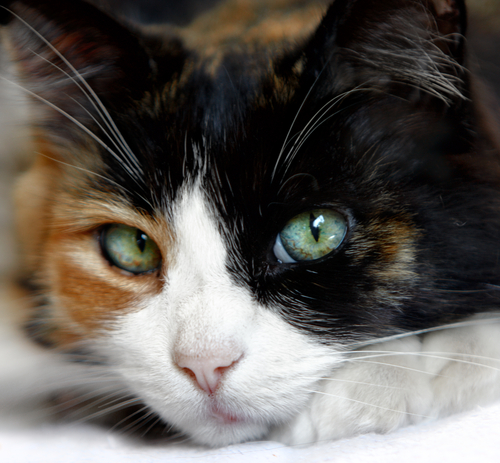
Coughing in cats, especially if it's been happening for awhile, is usually not due to hair but a clinical sign of an inflammatory problem affecting the lower respiratory tract. Some examples of this are asthma or bronchitis. The actual number of affected cats is unknown, but estimated to be between 1-5% of the feline population. That's a lot of poor coughing cats!
Feline asthma or bronchitis is believed to be caused by some type of inhaled allergen/irritant. Some examples inside your home would be dust from cat litter, cigarette smoke, incense, perfume or hairspray and carpet fresheners. Pollens or mold, parasites, primarily lungworms or heartworms, and some viruses or bacteria can also cause the same problem. Once your cat becomes sensitized to an allergen, upon repeated exposure, the airways become chronically inflamed and constricted resulting in coughing, wheezing and over time respiratory distress. A coughing cat is one that needs to be examined by your veterinarian and acute asthmatic attacks can be life-threatening. If you observe your cat open-mouth breathing or having very rapid respirations this is an emergency and your veterinarian should be contacted immediately.
After a thorough physical exam, if your cat is stable, x-rays (radiographs) will be taken to examine the airways to look for characteristic changes seen with asthma. Other causes of respiratory distress such as trauma, pneumonia, heart disease, or lung cancer can also be ruled out. Other diagnostics that help determine the cause of asthma are checking a stool sample to look for lungworms and a blood test to check for heartworm disease. Since mycoplasma (bacteria) can be a contributing factor as well, often a course of antibiotics is prescribed.
Once asthma has been diagnosed the goal of therapy is to reduce inflammation within the airways and relieve bronchoconstriction. There is no cure for feline asthma at this time. Steroids are most commonly used and the best way to administer them is via an inhaler just like a person would use. A spacer called the AeroKat chamber enables the inhaler to be given to your cat in a non-stressful way. Administering the steroid this way also eliminates the potential side effects such as diabetes, immune suppression, and kidney insufficiency that can happen if the steroids are given orally or in an injectable form. In more critical situations, a bronchodilator is also used and this is given through the spacer as well.

Environmental therapy is also an important part of care for your asthmatic cat. Eliminating irritants such as listed above can help alleviate some symptoms. Using a non-dusty litter like recycled pellets (e.g. Yesterday's News) or cedar shavings and placing a Hepa air filter in areas where your cat spends alot of time can help as well.
There are many reasons your cat may be coughing and often a hairball is not the cause. If coughing has been seen for a while, make an appointment with one of our veterinarians and we can get your cat breathing better in no time.
By Dr. Taylor Wallace, DVM
Tags: feline asthma, Dr Taylor Wallace, cat cough, aerokat







